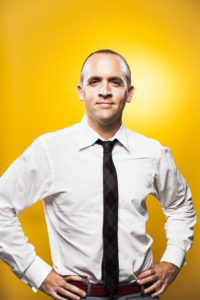Catching up with past NDSA Innovation Awards Winners: Dr. Anthony Cocciolo
Nominations are now being accepted for the NDSA 2020 Innovation Awards.
Anthony Cocciolo won a 2012 Innovation Award in the Individual category. He was  recognized for his innovative approaches to teaching digital preservation practices, in particular his work partnering classes with archival institutions to work on the digitization and digital preservation of analog audio collections. Cocciolo is currently the Dean of the Pratt Institute School of Information.
recognized for his innovative approaches to teaching digital preservation practices, in particular his work partnering classes with archival institutions to work on the digitization and digital preservation of analog audio collections. Cocciolo is currently the Dean of the Pratt Institute School of Information.
What have you been doing since receiving an NDSA Innovation Award?
In 2012, I was an Assistant Professor at Pratt Institute School of Information. In 2020, I am still at Pratt, but now I am the Dean of the School. I still teach the course “Projects in Digital Archives,” where the class is teamed up with a local archive to do digital archives projects, and what I had received the NDSA award for. You can find this recent article from Pratt about some of the recent work going on in the class, which has included a lot of early LGBTQ+ radio and TV preservation work.
These days I oversee the School of Information, which is the oldest information school in North America, having started training librarians in 1890. Today the school is based in Manhattan and enrolls about 230 graduate students across several Masters programs. The pandemic has kept things challenging, as we work to return to campus in the fall, address issues for international students, and work to keep each other healthy and safe.
What did receiving the NDSA Innovation award in 2012 mean to you?
I think it really helped solidify my interests in digital preservation. I am still very much involved with digital preservation work. Pratt, in collaboration with NYU’s Moving Image Archiving and Preservation program (MIAP), has taken over the Digital Preservation Outreach and Education (DPOE) program from Library of Congress in 2018. Just recently we received a grant from The Andrew W. Mellon Foundation to restore activity to the project, relaunching it as DPOE Network (DPOE-N), which is exciting. You can find out more about the project at dpoe.network.
What efforts, advances, or ideas over the last 5-8 years have caught your attention or interest in the area of digital stewardship?
I think that audiovisual preservation is finally getting more attention now than it did back in 2012. I wrote a book back in 2017 called Moving Image and Sound Collections for Archivists that argued that analog audio and video needed to be digitized, and I am happy to see that idea is viewed as more positively these days.
Overall, I am just happy to see the spread of digital stewardship and the notion that digital materials do not just preserve themselves, and that digital devices are where information of enduring value is largely created.
As the Dean at Pratt Institute School of Information, how has pedagogy grown and/or innovated as it relates to digital stewardship and digital preservation?
I think my pedagogy is largely the same (e.g., having students work on real-world problems in teams), I do try to keep it interesting by changing up the projects. The past year we were starting to work on repairing open reel tapes with broken splices for digitization when the pandemic hit (the materials we finished are available here). Other times I have had students work on born-digital project with lots of forgotten file formats. We’ve done projects featuring U.S. Presidents (e.g., digitizing photographs from the New York Times’ “morgue”), early Gay TV programs on U-Matic tape and more. The variety keeps things interesting.
What are some priorities or challenges you see for digital stewardship?
I do think that audiovisual continues to be a challenge and priority. Trying to buy U-Matic VTRs for digitization is getting increasingly difficult. I think web archiving, while with some exciting newer advancements (like the WebRecorder), still needs more attention and coordinated work. Digital preservation education is still a needs area, as we do still see examples where archives/special collections have not made the transition to collection born-digital materials. I am hopeful that the DPOE-N project mentioned earlier will help address this need.
The post Catching up with past NDSA Innovation Awards Winners: Dr. Anthony Cocciolo appeared first on DLF.
